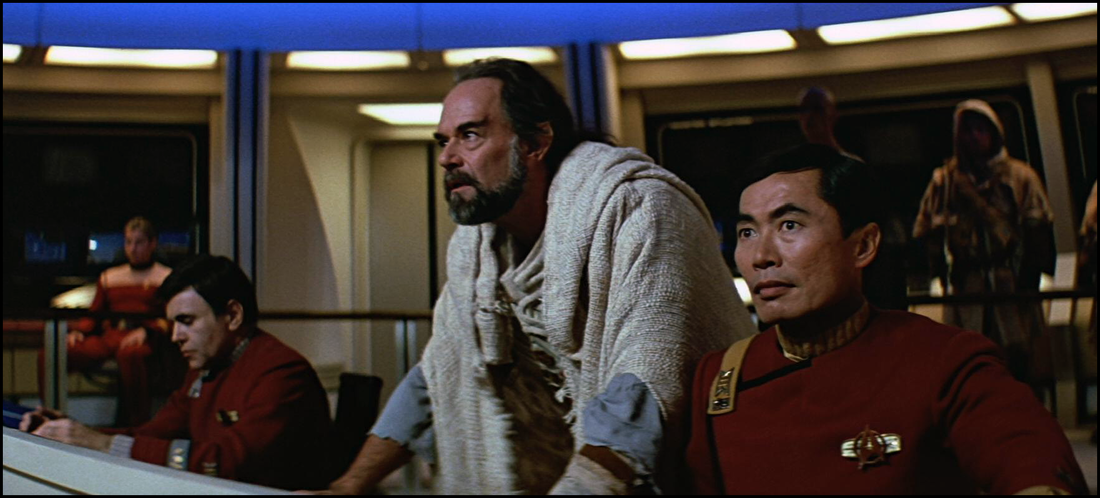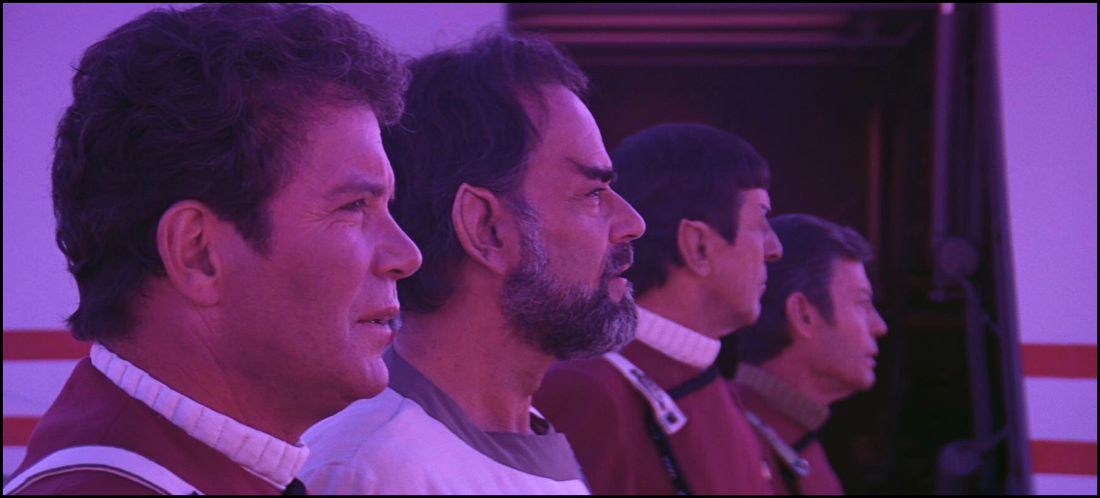Honestly, there are a number of good reasons for such a low ranking amongst other franchise entries and even the wider body of Science Fiction and Fantasy films. It touches on issues of religion or faith, and that’s a topic many folks would rather keep out of the genre-viewing diet. Its storyline – that of the crew of the Enterprise being sent on a commando-style rescue mission to Nimbus III – certainly pushed the bounds of believability: a younger (ahem) and much more fit Starfleet security team would’ve made far more narrative sense as opposed to a band of “hardened” sixty- and seventy-year-olds. And, of course, it can’t escape mentioning that the feature’s special effects work was far less “special” and more “work” for viewers to accept, especially given the state of the industry at the time. Even writer/director/star William Shatner has opined about his effects’ budget and how the film’s final reveal had to be reconceived to fit within the studio parameters.
Still, if one sets aside some moments of rather obvious campy humor in the script, I’ve often argued that Frontier featured some fascinating moments exploring a subject that, perhaps, Shatner himself understood best, that being the franchise’s much celebrated trinity relationship of Kirk, Spock, and McCoy. The three characters have moments that bookend the feature – I’m speaking here of the campfire sequences that open and close the flick – that are written with some admirable subtlety, and these scenes both dissect and amplify what has best served their respective identities over decades in stories. Kirk’s gung-ho clashes with McCoy’s professional desire to preserve all life, and both come into conflict with Spock’s logical resolve to deduce before acting. Though a few sharp words are exchanged, judgements are withheld; and it’s suggested that possibly the best life lived combines just enough from each three position to keep everyone grounded.
It’s this precipice that leads me to always conclude that Frontier’s biggest mistake – all other issues aside – really was the film’s failure to let this same sentiment be explored when the captain, his doctor, and first officer confront Sybok, the kinda/sorta villain who sets all the events of the picture in motion.
After Sybok and his band of rebels take control of the Enterprise, the trinity are sequestered in the captain’s lounge wherein the spiritual leader finally explains to them (and the audience, of course) what set him on this particular course of action. His pursuit of Sha Ka Ree – the Vulcan ‘center of creation’ – somehow granted him the ability to conceive the pain of others, to project it on display for others, and to assist in healing the sufferer of what ails him most. Every antihero needs to prove his worth, and Sybok correspondingly takes both Dr. McCoy and Mr. Spock on quick tours through their psyches. It’s revealed that Bones – the series’ longtime healer – allowed his elderly father to succumb to a condition that was soon thereafter cured; and this pain of an ill-timed decision weighed heavily on the physician throughout his life. By comparison, Spock showed audiences something we’d long known – that he feared never quite being good enough as a half-Vulcan, half-human hybrid to his full-blooded Vulcan father. These were great emotional scenes – honestly a rarity in classic Star Trek – and they were played with conviction by all actors involved.
This, I think, is the greatest failure of Star Trek V, and I think it demonstrates why audiences never really connected with the film the way they had other installments. As we see following Kirk’s refusal, the good doctor and Mr. Spock recover the effects of having their pain relieved rather quickly. They’re not brainwashed into blind servitude, certainly not in the manner that other crewmembers are, and maybe – just maybe – their characters are elevated a bit in stature precisely because that which helped shape them is fully shared. When inspirations – good or bad – are known, then a bond is either created or strengthened; and I, for one, certainly felt closer to these two than I ever had before. I knew what set them on their respective paths – or helped convince them a change was needed – and I identified with it.
While I understand why Kirk (maybe Shatner) felt an examination of the captain’s pain was – ahem – illogical, I disagree with that creative choice. A glimpse into the man – the legend – and his past could’ve been monumental, and that’s saying something for a character that has already been explored in countless hours of television, books, and prose. Some moment from his past that explored a twist he never expected or a choice he later regretted would’ve added another layer to the character’s already rich foundation; and I’m convinced it likely would’ve made his fans and supporters only love him more.
A few years later, audiences do finally get a look behind that curtain.
In 1994’s Star Trek: Generations, Captain Kirk is thrown into the Nexus – a whirling ribbon of energy that transcends time and space – and he finds himself exploring what we’re led to believe was one of the regrets to his storied life: he passed up a chance for marital bliss with the return to service in Starfleet. Here – just as with Sybok’s promise in the earlier film – Kirk faces his pain and eventually refuses to surrender to it. Why? Not because it wasn’t real but rather because he knew there was no risk with that choice any longer. I suspect whatever epiphany Kirk would’ve explored with the spiritual leader would’ve achieved the same result, and the crew would’ve been still on track to save life itself. What helped make Generations stronger with the captain’s reveal and response served to make Frontier weaker.
-- EZ



 RSS Feed
RSS Feed